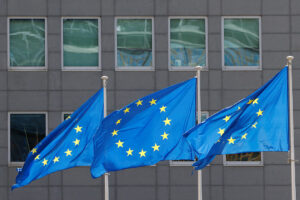THE PHILIPPINES is touting itself as a potential “platform” for broadening European trade in the Indo-Pacific in free trade feelers sent to the European Union (EU).
Trade Secretary Alfredo E. Pascual made the pitch during a meeting with European Commission Vice-President and Trade Commissioner Valdis Dombrovskis on June 26 in Brussels, during which he pressed for the resumption of talks on a free trade agreement (FTA).
Mr. Pascual described a free trade agreement with the Philippines as a “strategic platform for economic engagement for the EU in the Indo-Pacific,” which would result in a “more permanent mechanism” for furthering the Philippines-EU economic relationship.
The meeting was part of the Department of Trade and In dustry’s (DTI) three-week European Investment Roadshow, running from June 18 to July 6.
“To maintain strong economic relations with the EU, it is important that a PH-EU FTA is in place before the Philippines eventually loses its Generalised Scheme of Preferences Plus (GSP+) status due to continued economic growth,” Mr. Pascual said.
“With the country’s positive trajectory towards reaching upper-middle income status, it is high time for the Philippines and the EU to resume FTA negotiations,” he added.
The last round of negotiations for the Philippines – EU FTA took place in 2017 after talks officially began in 2016.
Aside from the FTA, Mr. Pascual said the reauthorization of GSP+ status is vital, adding that the finalization of the new GSP scheme will result in more certainty for Filipino exporters and EU importers.
The current GSP+ regulation is set to expire by the end of 2023.
“The continuation of EU GSP+ is beneficial both for the Philippines and the EU in driving inclusive growth and sustainable development,” Mr. Pascual said.
In response, Mr. Dombrovskis said the Philippines should await the result of the EU’s ongoing trialogue deliberations regarding the finalization of the new GSP scheme regulation.
In September 2021, the European Commission published a proposal for a new EU-GSP scheme from 2024 to 2034.
GSP+ is an incentive arrangement that grants the Philippines zero-tariff treatment on 6,274 products or 66% of all EU tariff lines. Some of the top Philippine GSP+ exports are crude coconut oil, vacuum cleaners, prepared or preserved tuna, and electro-thermic hair dressing apparatus.
In 2022, the Philippines exported €2.93 billion worth of products to the EU under the GSP+, equivalent to a 77% utilization rate.
The DTI said in a separate statement that Mr. Pascual also met with European Investment Bank (EIB) Vice-President Kris Peeters in Brussels on the possibility of financing Philippine projects.
According to the DTI, the EIB has expressed interest in the Mindanao Agro Enterprise Development Project, which seeks to improve competitiveness and develop the food value chain for the main southern island.
It added that the EIB is also interested in financing projects related to digital connectivity, public transport, green economy, renewable energy, agriculture, and health.
“As the largest multilateral financial institution globally, owned by EU member states, the EIB… prioritizes projects related to climate change mitigation and adaptation, social and economic infrastructure development, and support for small and medium enterprises (SMEs) at the local level,” the DTI said.
The DTI said that Mr. Pascual also met with a Belgian delegation consisting of officials from Walloon Export and Foreign Investment Agency, Belgian Foreign Trade Agency, and Flanders Investment and Trade on June 26.
According to the DTI, Belgian companies in the Philippines are engaged in manufacturing, services, energy, and logistics.
“Trade between Belgium and the Philippines has shown a significant increase, primarily in the exports of Belgium to the country of its machinery, pharmaceutical products, chemicals, and vehicles,” the DTI said.
In 2022, the EU was the Philippines’ fifth largest trading partner with trade valued at €15.23 billion. It was the sixth largest export market at €7.96 billion, and sixth leading source of imports at €7.14 billion. — Revin Mikhael D. Ochave

